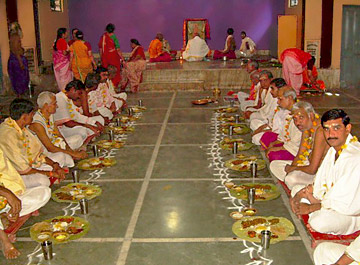 In the Hindu mythology it is mentioned that Samaradana or public feasts are often given to Brahmans. Those who are at the expense of the entertainment consider it as one of the most meritorious of their action. The Samaradana is given on various bases, for example on the dedication of a new temple, to recompense by so good a work the sins of the dead. Sometimes Samaradana is done to obtain success in the time of war, sometimes to avert an evil constellation, to bring rain in the time of great drought and it is also performed to celebrate a birth or marriage of a great prince or other high dignitary. The Brahmans perform the Samaradana devotedly in order to gain the highest rank in good work.
In the Hindu mythology it is mentioned that Samaradana or public feasts are often given to Brahmans. Those who are at the expense of the entertainment consider it as one of the most meritorious of their action. The Samaradana is given on various bases, for example on the dedication of a new temple, to recompense by so good a work the sins of the dead. Sometimes Samaradana is done to obtain success in the time of war, sometimes to avert an evil constellation, to bring rain in the time of great drought and it is also performed to celebrate a birth or marriage of a great prince or other high dignitary. The Brahmans perform the Samaradana devotedly in order to gain the highest rank in good work.
The time when the Samaradana is announced the men and women assemble at the place from seven or eight leagues around, with appetites well disposed to take every advantage that the generosity of their entertainer can yield them. At times thousand of people assemble Samaradana from considerable distances. All the people are Brahman and they keep a strict watch on each other, ceremonies are most scrupulously observed. The men and women partake the food provided, seated on the ground, in separate rows.
During or after the meal at Samaradana, Sanskrit hymns and mantras are often sung. After the Brahmins finish singing they roar out in loud approbation, `Hara, Hara, and Govinda`. The host of the entertainment, if not a Brahman himself, cannot sit down with his guests, but shows himself in the assembly after the feast is over. There he faces himself before those `gods of the earth` whom he has had the honour to entertain, and they in their turn give him their benediction.
If the benefactor in addition to the entertainment makes a present of money or cloth at the Samaradana, then he is trumpeted forth by the Brahmans who share it. He is exalted above the gods and this is a sufficient reward for his profusion.




















